
Leucadendron tinctum, the spicy conebush, is a flower-bearing shrub that belongs to the genus Leucadendron and forms part of the fynbos. The plant is native on the Western Cape, where it occurs in the Hex River Mountains up to Hottentots Holland Mountains and Langeberg. The shrub grows 1.3 m tall and bears flowers from July to August.

Leucadendron linifolium, the line-leaf conebush, is a flower-bearing shrub that belongs to the genus Leucadendron and forms part of the fynbos. The plant is native to the Western Cape, South Africa.
Leucadendron cinereum, the scraggly conebush, is a flower-bearing shrub that belongs to the genus Leucadendron and forms part of the fynbos. The plant is native to the Western Cape where it occurs from Hopefield and on the Cape Flats from the Berg River estuary to Kraaifontein.

Leucadendron concavum, the Pakhuis conebush , is a flower-bearing shrub that belongs to the genus Leucadendron and forms part of the fynbos. The plant is native to the Western Cape where it occurs at the Pakhuis Pass in the Cederberg.
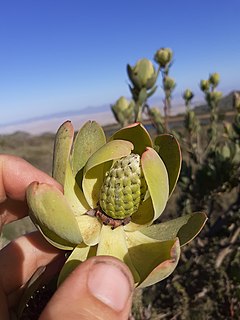
Leucadendron diemontianum, the Visgat conebush, is a flower-bearing shrub belonging to the genus Leucadendron and forms part of the fynbos. The plant is native to the Western Cape where it occurs on the foothills of the Great Winterhoek Mountains at Visgat, Onderboskloof and Rosendal as well as at Heuningvlei in the northern Cederberg.

Leucadendron rourkei, the Uniondale conebush, is a flower-bearing shrub belonging to the genus Leucadendron and forms part of the fynbos. The plant is native to the Western Cape and Eastern Cape, South Africa. The plant is rare.
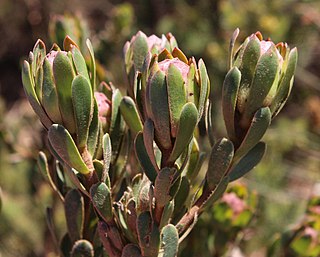
Leucadendron stelligerum, the Agulhas conebush, is a flower-bearing shrub that belongs to the genus Leucadendron and forms part of the fynbos. The plant is native to the Western Cape where it occurs from Elim to the Agulhas Plain.

Leucadendron nitidum, the Bokkeveld conebush, is a flower-bearing shrub that belongs to the genus Leucadendron and forms part of the fynbos. The plant is native to the Western Cape where it occurs at Cederberg, Koue Bokkeveld and Swartruggensberge.

Leucadendron pondoense, the Pondoland conebush, is a flower-bearing shrub that belongs to the genus Leucadendron and forms part of the fynbos. The plant is native to the Eastern Cape where it occurs in the Pondoland from Port St. Johns to Port Edward.

Leucadendron verticillatum, the Klapmuts conebush, is a flower-bearing shrub that belongs to the genus Leucadendron and forms part of the fynbos. The plant is native to the Western Cape where it occurs on the Cape Flats at Hercules Pillar, Muldersvlei and Fisantekraal.

Leucadendron rubrum, the spinning top, is a flower-bearing shrub belonging to the genus Leucadendron and forms part of the fynbos. The plant is native to the Western Cape, South Africa.

Leucadendron floridum, the flats conebush, is a flower-bearing shrub belonging to the genus Leucadendron and forms part of the fynbos. The plant is native to the Western Cape, where it occurs in the Cape Flats, from Rondebosch to Kuils River and also in the Cape Peninsula around most wetlands. The shrub grows 2 m tall and bears flowers from September to October.
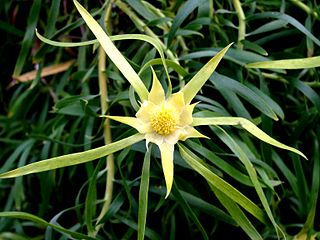
Leucadendron eucalyptifolium, the gum-leaved conebush, is a flower-bearing shrub belonging to the genus Leucadendron and forms part of the fynbos. The plant is native to the Western Cape and the Eastern Cape, where it occurs in the Potberg, Riversdal Plains, Langeberg, Outeniqua Mountains, Tsitsikamma Mountains, Kouga Mountains, Elandsberg, Swartberg, Waboomsberg, Warmwaterberg, Touwsberg, Rooiberg and Soetwaterberg. The shrub grows 4 m tall and bears flowers from July to October.
Leucadendron tradouwense, the Tradouw conebush, is a flower-bearing shrub belonging to the genus Leucadendron and forms part of the fynbos. The plant is native to the Western Cape, where it occurs in the Langeberg Range at the Tradouw Pass and Groot Vadersbos. The plant is rare, there are only two known populations.
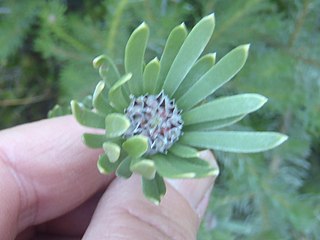
Leucadendron singulare, the Kammanassie conebush, is a flower-bearing shrub belonging to the genus Leucadendron and forms part of the fynbos. The plant is native to the Western Cape where it occurs in the Mannetjiesberg in the Kammanassie Mountains. The plant is rare. The shrub grows only 30 cm high and spreads out. It blooms in October. The plant dies after a fire, but the seeds survive. The seeds are stored in a toll on the female plant and fall out of the toll to the ground after two months where they are spread by ants. The plant is single-faced and there are separate plants with male and female flowers, which are pollinated by insects. The plant grows in crevices on peaks at heights of 2,000 - 2,150 m.
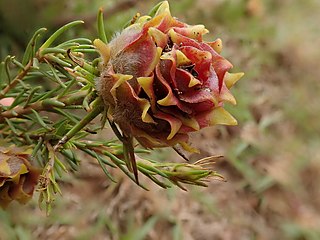
Leucadendron laxum, the Bredasdorp conebush, is a flower-bearing shrub belonging to the genus Leucadendron and forms part of the fynbos. The plant is native to the Western Cape, South Africa, where it occurs from Hermanus to Agulhas.

Leucadendron pubescens, the grey conebush, is a flower-bearing shrub belonging to the genus Leucadendron and forms part of the fynbos. The plant is native to the Western Cape where it occurs on the Bokkeveldeskarp, Gifberg, Cederberg, Piketberg, Olifantsrivier, Sandveld, Koue Bokkeveld, Hexrivierberge, Bonteberg as well as the Kwadouwberg, Witteberg and Touwsberg.
Leucadendron loranthifolium, commonly known as the green-flower sunbush, is a flower-bearing shrub belonging to the genus Leucadendron and forms part of the fynbos. The plant is native to the Western Cape where it occurs in the Gifberg, Cederberg, Sandveld, and Hex River Mountains.

Leucadendron levisanus, commonly known as the Cape flats conebush, is a flower-bearing shrub that belongs to the genus Leucadendron and forms part of the fynbos. The plant is native to the Western Cape, where it occurs in the Cape Flats from Vishoek to Eerste River and Mamre. The shrub grows 2 m tall and bears flowers in October.

Leucadendron nervosum, the silky-ruff conebush, is a flower-bearing shrub that belongs to the genus Leucadendron and forms part of the fynbos. The plant is native to the Western Cape, where it occurs on the Jonaskop in the Riviersonderend Mountains and Grootberg in the Langeberg. The shrub grows 1.5 m tall and flowers in September.





















